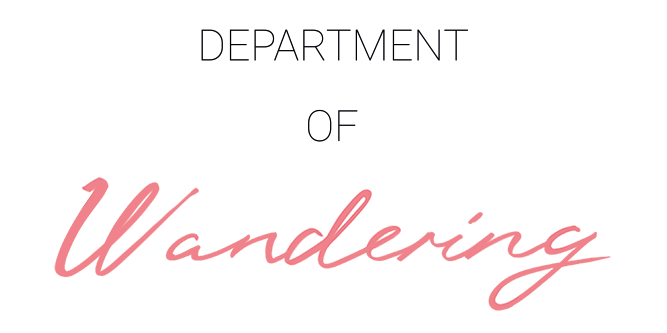
All of us here at The Department of Wandering have been blogging for a while now, and our founder, Rachel, even has a course out about it (enrolment is closed now but it’s available again soon)! Suffice to say, we have all learned a lot about blogging and running online businesses. But it hasn’t been easy. Here are some of the things we wish we knew before we started blogging.
9 things we wish we knew before we started blogging:
1. The basics of SEO
Above anything else, growing your blog’s traffic should be your main goal. While social media is constantly changing and you never can quite control what happens, your blog is your own domain. If there’s one piece of advice we’d give anyone who wants to grow a blog into a business, it’s learning the basics of SEO or search engine optimisation before you start.
Your first stop? Check out Moz’s Beginner Guide to SEO.

2. How to define our niche better
Defining your niche can be difficult when you’re just starting out because you can’t predict how it will grow or how you’ll change. Our advice is to start with what you already know. What are the topics that you are so passionate and familiar with that you can write 50,000+ words about and still have another 50,000 left in you? What story do you want to tell? Go from there and pick something that can grow with you.
3. The importance of photography
We cannot stress how important proper photography is for running a professional, profitable blog. While an iPhone can take a quality photo these days, crappy HDR shots just don’t cut it. While a big, professional camera may be out of your price range, there are a few options to use until you can afford one.
- Use stock photos. Websites like Pixabay and Unsplash have hundreds of thousands of free, high-quality images to use. We’re using some on this post right now!
- Hire someone to do some branding photos for you in the meantime. If you want to get some professional headshots and general photos to use on your blog, hire a local photographer, put together a mood board, and you’ll have a nice supply to use while you’re still learning and saving for your own camera.
4. How to find content that readers want to read
One of the hardest things is figuring out your target audience and then trying to write what they want. You really won’t know how to meet their needs until you have a steady supply of readers and can see what’s popular with them. What you should do until then is to read and study! Read similar blogs in your niche, scan online forums or Facebook groups, and jot down trends you see often. For example, if you want to start a living vegan blog, find out what people want to know. What are they constantly asking? Create posts that answer those very questions.
Related: 9 Reasons Why No One is Reading Your Blog (And How to Fix It)
5. Which Facebook groups and communities to join
Facebook groups can be an amazing resource when you’re growing your site and even when you’re a full-fledged success story. They offer support, commiseration and advice. However, a lot of them can be both useless and downright toxic.
Knowing the right groups to join can greatly help you in the long run. Don’t be afraid to test out a lot of different ones and leave them as you see fit. Find groups that fit your niche but also groups about blogging and online business in general. There are a tonne out there, but start with our Facebook group, The Department of Wandering’s Laptop Army 😉
Related: The Best Facebook Groups for Bloggers

6. How on earth to use Google Analytics
For the longest time, Google Analytics looked like pure gibberish to me. I downloaded it and attached it to my site, but I just didn’t get it. What was I supposed to be looking for? Even when I read guides that dumbed it down to kindergarten level, I was still left scratching my head.
Which is silly! It’s really not that difficult to use and can be wildly helpful in tracking a variety of statistics on your website. To make things super simple, though, this is what you want to track from the beginning:
- Sessions - how many monthly sessions you’re getting. Many ad companies use sessions to mark if they want to work with you or not. (Go to ‘Audience’ on the sidebar)
- Page views - how many page views you’re getting. Don’t feel bad if out of your first 100 views, you yourself were 90 of them! We’ve all been there! (Go to ‘Behaviour’ on the sidebar)
- Acquisition - see where your traffic is coming from. The two big ones to keep an eye on are ‘Organic’, which is the traffic coming from Google and ‘Social’, which is the traffic coming from your social media accounts. (Go to Acquisition > Social to see a breakdown of Pinterest, Facebook, etc.)

7. What the heck affiliate marketing is
Affiliate marketing is either confusing all by itself or it gets confused with multilevel marketing, which is another (and scammy) topic unrelated to blogging. It can be a great income stream, though you most likely won’t make much off of it for a while.
Basically, affiliate marketing works like this: I read a book, and I write a review of it on my blog. Then if you want to read it, you click on my link, buy it, and I make a small profit. It doesn’t mean you pay more, it just means I get some thanks from the main company for referring you. It’s absurdly small too, maybe for a $20 book, I get 60 cents. This adds up, though, if you have readers making big purchases and often.
Think of companies you use and like now – car rentals, clothing companies, food delivery services, etc. Just Google their name + affiliate and see if you can join their programs.
8. What ‘success’ looks like
Now for some more personal tips because they’re just as important. ‘The root of all unhappiness is comparison’, after all. You have to set personal goals for yourself based on what you want, not what others have. Sure a million Instagram followers sounds awesome, but is that really what your long-term plans are tied to? Yes, it might feel like X blogger reached 30,000 page views while you’re stuck at 5,000 page views, but remember, blogging is a marathon, not a sprint.
I’ve been a swimmer my whole life and while competing against others was a part of it, the bigger deal was competing against myself and trying to beat my own times. Set goals based on your own statistics. Did you get 4,000 page views from Pinterest this month? Aim for 4,500 the next. When a year goes by, compare your stats to the year before and see how much you’ve grown.

9. How to not feel wildly overwhelmed
Last but not least, the biggest thing with blogging is finding a work-life balance. Do not jump into blogging and quit your job because it does take time to turn a blog profitable (and some just never do). Create a calendar, figure out what you can reasonably produce each week, and stick to it. And, for the love of your health and your bum, get up and walk around for 20 minutes every day if you’re sitting at your desk!
Related: On the Brink of Blogger Burnout? Here’s How to Avoid It!
Looking for more posts about blogging? You might like these:
- 21 Blogging Tasks for When You Don’t Feel Like Writing
- Struggling with Page Views? How to Write Better Blog Post Titles
- 10 Rules for Travel Bloggers
Like this post? Pin it for later!

What are some tips you have for new bloggers? Or if you’re a new blogger, what do you want to know? Tell us in the comments!





I loved this post!
I like the idea of Facebook groups, but I’m not using the platform as my blog. Do you have any tips for similar groups on other platforms?
Hi Krystal! Thanks so much! We don’t blog on Facebook either but use it as a social media channel to connect with our readers. We use WordPress to blog. Facebook really is the best channel for groups and other social media platforms don’t handle groups in the same way. All the best with your blog!
Very informative article, thanks.
Very very informative and interesting article. I am a new blogger and I think I will definitely benefit by your article. Thanks.